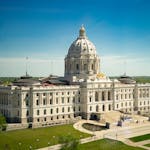Amid all the people sharing their opinions regarding the Minneapolis Police Department, I thought the public should hear from someone actually doing the job.
For 26 years, I have been an MPD patrol officer dedicated to doing the work you have asked me to do on your behalf.
This has been difficult year for everyone, but especially for MPD officers. When the pandemic hit, we still came to work with the risk of infection when many people were at home working.
We still came to work when, as human beings, we also were affected by George Floyd's death and our own questions about why it happened.
We still came to work despite seeing our leadership abandon the Third Precinct officers and station while failing us and the citizens by limiting our ability to respond to the looting and destruction of our city.
We still came to work though we were disheartened by seeing nine members of the City Council, our employers, shout that we should be disbanded, and then propose a charter amendment that would do so.
We still came to work although it was disappointing to see our chief and mayor pull out of our labor contract negotiations.
We still came to work even though more than 100 officers left or could not work due to injuries, leaving far fewer of us to answer calls and, when we finally could respond, deal with rightfully upset citizens.
We still came to work despite skyrocketing levels of violence creating victims for whom there was no outcry.
We even came to work when our City Council threw salt in our wounds by rejecting a temporary home for the Third Precinct.
Despite the emotional toll on me and my family, and despite continuing to report for duty against escalating challenges, the most damaging of these indignities has been that I now stand falsely accused with my brothers and sisters in uniform of being responsible for the rise in violence because we are "shirking our duty."
While the elected officials who make these claims might not know it (or might not care), the activities of MPD officers are monitored continuously by technology. Our MPD phones track our location; we wear body cameras; our squad cars have cameras, GPS and computers; dispatch software records calls, the time we were dispatched to, arrive at and clear from a call. We must notify dispatch when we are unavailable while writing a report or trying to grab a meal or a restroom break.
All of the data generated by this technology is available to our supervisors and even to council members so that they can review our productivity. council members could have asked for this data to find out whether cops were working hard before accusing us of a "slow down."
However, it is far easier and more politically expedient to shift the blame onto the cops — while ignoring that it further erodes public trust.
Contrary to these claims, neither I nor any MPD officer I know has been derelict in his or her duty. Further, I doubt the legitimacy of the claims that officers have said otherwise. If any officers have shirked their duty, the names should be reported and, if proven true, those officers should be held accountable.
One thing is certain — our response times are woefully inadequate. However, here are the real reasons: Calls for service have increased significantly; we have fewer officers available to handle calls; the nature of calls is much more serious (meaning that more officers and time are required to resolve them); ill-advised policy changes now treat even mundane tasks such as putting handcuffs on a compliant person as a "use of force" for which a written report must be prepared (putting us at a keyboard for up to an hour rather than on the street); and the number of shootings has increased dramatically.
Recently, there were eight shootings on the same night just in the Fourth Precinct. Each shooting scene requires anywhere from eigth to 12 officers to secure evidence, search for suspects and witnesses, and provide crowd control. The number of officers required at the scene of a shooting is often more than the entire complement of officers on a shift in some precincts. We try to manage by sending officers from other precincts to assist, but that leaves those precincts short-staffed and our responses delayed.
Yet, rather than consider these facts — including the cold reality that by publicly vilifying their own police officers they have created a sense among many that they are free to perpetrate violent acts without consequence — some council members have chosen to respond to the righteous complaints from their constituents by instead scapegoating MPD officers.
I wholeheartedly agree that the extent to which the community trusts its police officers must improve. But it is unfair and ineffectual to cast the responsibility for a lack of trust solely on officers, when Minneapolis's elected officials have been telling the public how awful we are for several years.
All of the city's elected officials have a responsibility to help us restore trust. The first step is for them to immediately cease the irresponsible spread of false narratives about their employees.
Sadly, I won't be holding my breath waiting. But the public can rest assured that I and all MPD officers will continue to come to work and do the best we can no matter the extent to which their elected "leaders" make our job more difficult.
Mark Johnson is a Minneapolis police officer and board member of the Police Officers Federation.




